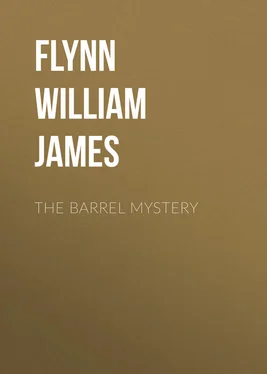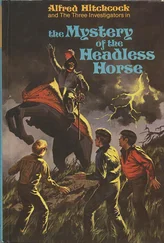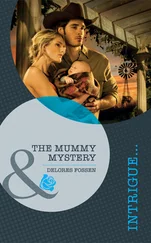William Flynn - The Barrel Mystery
Здесь есть возможность читать онлайн «William Flynn - The Barrel Mystery» — ознакомительный отрывок электронной книги совершенно бесплатно, а после прочтения отрывка купить полную версию. В некоторых случаях можно слушать аудио, скачать через торрент в формате fb2 и присутствует краткое содержание. Жанр: foreign_antique, foreign_prose, foreign_sf, на английском языке. Описание произведения, (предисловие) а так же отзывы посетителей доступны на портале библиотеки ЛибКат.
- Название:The Barrel Mystery
- Автор:
- Жанр:
- Год:неизвестен
- ISBN:нет данных
- Рейтинг книги:5 / 5. Голосов: 1
-
Избранное:Добавить в избранное
- Отзывы:
-
Ваша оценка:
- 100
- 1
- 2
- 3
- 4
- 5
The Barrel Mystery: краткое содержание, описание и аннотация
Предлагаем к чтению аннотацию, описание, краткое содержание или предисловие (зависит от того, что написал сам автор книги «The Barrel Mystery»). Если вы не нашли необходимую информацию о книге — напишите в комментариях, мы постараемся отыскать её.
The Barrel Mystery — читать онлайн ознакомительный отрывок
Ниже представлен текст книги, разбитый по страницам. Система сохранения места последней прочитанной страницы, позволяет с удобством читать онлайн бесплатно книгу «The Barrel Mystery», без необходимости каждый раз заново искать на чём Вы остановились. Поставьте закладку, и сможете в любой момент перейти на страницу, на которой закончили чтение.
Интервал:
Закладка:
Among other things, I learned that Morello made frequent trips to Chicago and other cities where the counterfeit money seemed to flourish. Morello made a flying trip to New Orleans on one occasion when my men tracked him all the way. When his train arrived in Philadelphia we knew he was on board; when the train reached Baltimore we knew he was on the train, and when he arrived at Washington we knew where the "Black-Hand" leader was; and so on, till he arrived in New Orleans. On his arrival there certain Italian confederates were waiting for him and escorted their chief to a little Italian café where a conference was held in a back room lasting a little longer than two hours. Immediately after the conference was over, Morello took the next train back to New York.
Now enters into the story a man by the name of Antonio Cecala. Remember the name of this man, for he plays an important part in the game for the remainder of the story. Cecala, whom we will establish here as the third executive bandit in the Lupo-Morello group, made trips to Philadelphia, Pittsburgh and Buffalo. Cecala proved a valuable aid to the two "Black-Hand" captains.
Lupo was tracked by Secret Service men to cities where the counterfeit money was circulating. Another thread of investigation disclosed the not unimportant fact that there were members of the Ignatz Florio Association scattered all over the United States, especially in the populous centers where the five- and two-dollar counterfeit bills were being circulated. Besides, I was getting information daily from banks and merchants that the bills were being "pushed on the market" in abundance. I also learned that Italians from Corleone, Sicily, were the only Italians who were trusted in these centers by the Morello-Lupo gang, pointing to the probability that the bad bills were being circulated and "pushed" through native Corleonians exclusively.
Another clue showed that the bills were being manufactured somewhere in the immediate vicinity of New York City. I fine-combed the State of New York upon learning this. Naturally, my attention was focused on the Corleone Italians in New York City. In this way I gathered that Lupo had fled from his creditors, to whom he owed money in connection with his Italian grocery stores business. I finally succeeded in locating him living in Ardonia, New York, which is not very far from Highland on the Hudson River.
Past experience with these Morello-Lupo counterfeiters had taught me not to make an arrest until I had the net completely woven around the men who made the money. It is futile to arrest the "pushers-of-the-queer" – that is, the men who distribute the bad money among the little Italian grocery stores and shoe shops, small merchants, and the like. The arrest of these men only serves to warn the manufacturers of the bad money that the Secret Service is on the trail. The factory then closes down, and it is moved away to another location. Even if a conviction of the distributor of the bad money is obtained, no definite information can be obtained from the convicted man. He could not tell the government anything of value even if he wished to "squeal." As a rule, all that a "pusher" or distributor can tell is where he got the bad money.
Here is where Antonio Cecala looms up as a very important criminal factor in the counterfeiting game as plied by the Black-Handers under the leadership of Lupo and Morello. Remember this: Lupo and Morello always remain in the background . Cecala was the connecting link between the two leaders and the "pushers-of-the-queer."
Cecala was the man who got in touch with those who wanted to buy the counterfeit money to circulate it at the rate of thirty-five cents on the dollar.
Cecala was careful to deal only with men whom he knew – men who were from Corleone. He would pick six of these as his deputies. These deputies would choose six others, and so on. Cecala made business trips to other cities and took the orders for counterfeit money. He also had the say as to whom should be the agent in each city directly responsible to him. These various deputies were required to give their O. K. before any money would be sent to or given to any person by Cecala.
As soon as Cecala would receive a request from a deputy for money to be passed to certain Italians asking for it, it was Cecala's job to go to Lupo and Morello and obtain their sanction before the money would be handed along down the line from the distributing plant to the person buying it at thirty-five cents on the dollar for the obvious purpose of "pushing" it off on some unwary store-keeper.
The reader can now readily appreciate that with a crafty organization like this the "pusher" could not testify, even if he desired, that he had got the bad money from either Lupo or Morello. In fact, the "pusher" never even heard of either of the leaders except in some indirect way. Always, however, when the money was passed over to the pusher by one of Cecala's deputies or remote subordinates a sinister warning was given not to "squeal" if caught – a warning always portentous with the threat of murder.
To "squeal" meant fatal punishment. The man in the barrel is grim testimony to that fact.
At about this time I had pretty good evidence that the leaders of the counterfeiting gang were none other than Morello and Lupo, as I had suspected from the outset. Still, the time was not ripe to make arrests that would result in dead-sure convictions. It is true the two leaders could be arrested and charged with the making of these counterfeit notes, but where was the evidence connecting them with either the passing or the manufacture of the bills?
Let me here recite the case of Giuseppe Boscarini just to help the reader appreciate how very difficult it would be, at that juncture, to get Lupo and Morello involved in a way that would satisfy a court and jury that they were legally guilty of making and of passing counterfeit money:
While in Pittston, Pa., I learned that a man in that city named Sam Locino knew Boscarini, a New York agent of the Black-Hand Society. After talking with Locino for some time he told me that Boscarini had made several trips to Pittston lately, and that Boscarini was willing to sell counterfeit money to him. When Locino mentioned Boscarini's name I felt sure that the Pittston man was talking of one of Cecala's most active deputies.
In order to see how far Locino could go with Boscarini, and whether Cecala's deputy would turn counterfeit money over to Locino, I made the latter write a letter in the Sicilian dialect to Boscarini asking the deputy of Cecala to send a sample of the counterfeit money in order that Locino might see what it was like and whether he thought he would be able to get rid of some of it in Pittston.
When Locino had finished the letter I took it over to the post office, and with the Mayor of the city and the Chief of Police as witnesses I had the letter registered and addressed to Boscarini. I came back on the same train that brought the letter to New York, and when Boscarini signed for it at the registry window, this act of his was noted down by men of the Secret Service.
The next day Boscarini went to a sub post office on the Bowery and bought a special delivery and a two-cent stamp. He placed the stamps upside down on a large white envelope. An agent of the Service saw him buy the stamps and place them on the envelope; also, the agent saw the fictitious return address which Boscarini put on the envelope: the agent saw this as Boscarini put the letter into the slot at the sub-station.
I returned to Pittston on the same train with the letter and notified Locino that the letter was addressed to him at the General Delivery. He got the letter and opened it in my presence. It contained a counterfeit two-dollar bill and a counterfeit five-dollar bill of the kind made by the Morello gang.
Читать дальшеИнтервал:
Закладка:
Похожие книги на «The Barrel Mystery»
Представляем Вашему вниманию похожие книги на «The Barrel Mystery» списком для выбора. Мы отобрали схожую по названию и смыслу литературу в надежде предоставить читателям больше вариантов отыскать новые, интересные, ещё непрочитанные произведения.
Обсуждение, отзывы о книге «The Barrel Mystery» и просто собственные мнения читателей. Оставьте ваши комментарии, напишите, что Вы думаете о произведении, его смысле или главных героях. Укажите что конкретно понравилось, а что нет, и почему Вы так считаете.












